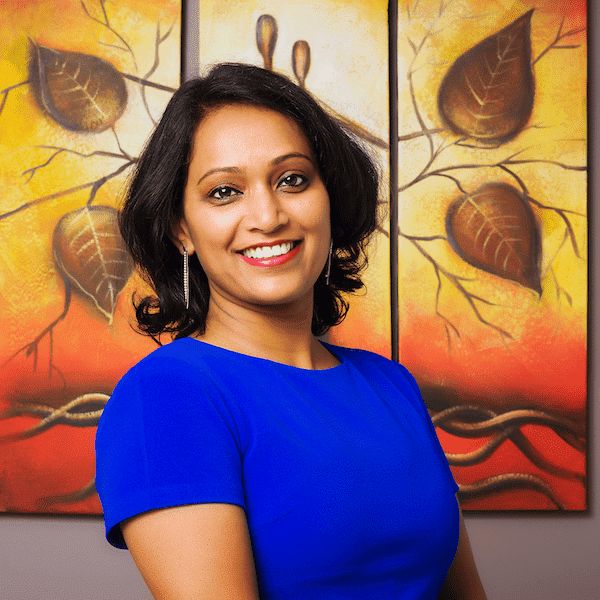
Image credits of Dr. Aruna Tummala: Trinergy
Integrative psychiatrist Dr. Aruna Tummala, medical director of Trinergy Center for Integrative Psychiatry (12800 W. National Ave., New Berlin), takes a holistic approach to emotional-physical health, blending Western medicine with Ayurveda, India’s 5000-year-old medical system that focuses on mind-body balance through diet, lifestyle medicine, natural herbs and detoxification protocols to achieve health and traditions.
Specialized medicine focuses on one organ or one tissue, but the body doesn’t work that way, Tummala explains. “We see this problem amplified in the field of psychiatry, where the prevailing belief is that there is a chemical imbalance in the brain. That has never been proven during 75 years of research, and much of the medication used to treat based on this faulty premise has not worked, either.” The holistic mental health premise is that mental illnesses can have an origin anywhere in the body—including the brain—and even in organs removed from the brain. There is no compartmentalization within our system, rather our organ systems interact with each other to keep us healthy. “When this fine communication system goes awry for whatever reason, you see problems manifesting in any system of the body. When I do evaluations, whether one is depressed or anxious, disease was manifesting in the gut or other places that we typically don’t associate with mental illness,” she says. Tummala’s protocols come from her training in integrative medicine, Ayurveda and natural and functional medicine. “The tools of functional medicine and Ayurveda has given me the framework to be able to come up with specific evaluation techniques and protocols to address the root causes.”
Balancing the Gut-Brain Connection
Tummala says integrative psychiatry starts with an in-depth consultation, including considering what might be happening in a person’s life that’s contributing to the patient’s difficulties and symptoms. Once those questions are answered, a treatment plan can be implemented. “In our clinic, that always includes diet and lifestyle changes. Our focus is always on healing the gut. I do a preliminary bloodwork, which includes looking at markers of inflammation, nutritional deficiencies and thyroid disease, especially in women.” She notes that mainstream medicine focuses only on thyroid stimulating hormone levels, but the presence of antibodies indicates an imbalance of the immune system, thus driving the symptoms of fatigue, depression and anxiety. Tummala points out that flu symptoms such as fatigue and lack of energy parallel symptoms of depression and anxiety. “The inflammation hypothesis is gaining a lot of traction in the field of mental health. With depression and anxiety, the root cause is an exaggerated, inflamed immune system that causes many of these symptoms that lead to psychiatric diseases.” Ayurvedic principles makes no distinction between physical and mental diseases, Tummala says. Basic concepts in Ayurvedic medicine are that disease begins in the gut, so all healing also begins in the gut—the same philosophy that is being repeated in functional and integrative medicine. Using a “food as medicine” approach, Tummala looks at each person’s unique physiology and psychology. In addition to food, she uses herbal and nutritional supplements, body therapies such as Ayurvedic massage, and detoxification protocols to cleanse the body and the mind and help bring body systems back into balance.
Trinergy has an ayurvedic spa, led by Vaidya Pandey, who practiced Ayurvedic medicine in India for 13 years before emigrating to the United States. She’s developed spa services that support emotional wellbeing. Their signature ayurvedic massage uses specific herbal oils that are organic and non-toxic. The massage involves a special technique that massages the energy points in the body, similar to acupressure, to open energy channels. Oher services offered are Udwarthanam, a dry powdered rub massage that uses traditional herbal formulations to exfoliate the skin, enhance lymphatic circulation and break down cellulite. Ayurvedic facials, henna hair treatments and shirodhara, a technique for relaxation and treatment of anxiety and insomnia, round out the spa services.
Using Hyperbaric Oxygen Therapy to Help Mental Health Conditions
Hyperbaric oxygen therapy (HBOT) is a pressurized chamber in which the patient steps into and breathes in purified air or 100% pure oxygen. That pressure helps deliver more oxygen to plasma and tissues. The increase of oxygen concentration can help reduce inflammation and stimulate stem cell growth. Tummala is certified in HBOT. “Hyperbaric medicine was started to treat decompression sickness and wound care,” she says. Practitioners then explored how HBOT could treat traumatic brain injury, stroke or autism. They found that wherever there is inflammation, whether outside or inside the body, oxygen helps decrease it. Tummala uses HBOT to treat many conditions, including autism. She has seen significant improvements in children, particularly with a seven year-old child whose motor skills improved after less than 20 HBOT sessions. “I think HBOT is going to be a game-changer, especially for families with autism,” she enthuses. “My job satisfaction has skyrocketed since I went to an integrative model of psychiatry because there is so much more I can do. It’s not a miracle treatment, but if patients invest in their own health with consistency and commitment, results will follow.” Article cited by SHEPHERD EXPRESS
